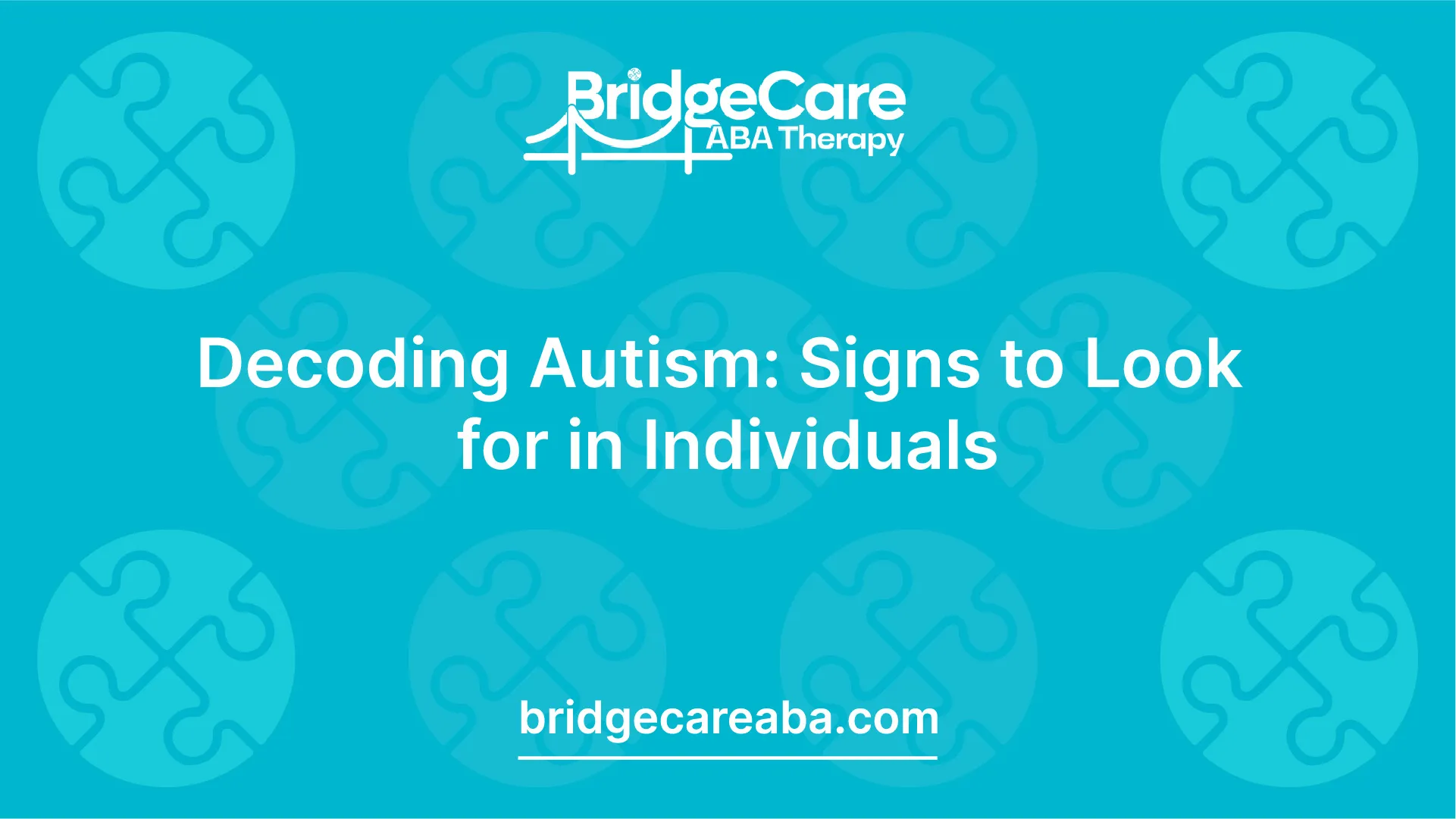Trick Symptoms And Signs to Acknowledge in People With Behavioral Autism
When you run into a person with behavioral autism, acknowledging essential indicators and signs and symptoms is necessary. In addition, sensory sensitivities can lead to frustrating experiences.
Obstacles in Social Communications
When you communicate with someone on the autism range, you might notice they battle with social signs and interaction. These obstacles can make social interactions feel frustrating for them.
Furthermore, you may find that they favor regimens and acquainted setups, which can restrict their willingness to participate in new social scenarios. When they do involve, they could speak about their interests in excellent information without discovering if you're interested. This can result in one-sided conversations that leave you really feeling detached. Understanding these obstacles can help you approach communications with empathy and perseverance, promoting an extra comfy atmosphere for both of you.
Trouble With Verbal and Non-Verbal Communication

Non-verbal communication can be a lot more challenging. You might see an absence of eye contact or minimal use gestures, which can make communications feel awkward. Facial expressions might not always align with the discussion, bring about confusion concerning their sensations. Acknowledging these indications is crucial, as it assists you far better assistance and involve with individuals on the autism range. By comprehending their interaction challenges, you can cultivate extra purposeful links and offer a much more encouraging atmosphere.
Repetitive Actions and Routines
Communication obstacles frequently come with other indications of autism, such as repetitive behaviors and a strong preference for regimens. You might discover that individuals with autism often participate in certain, repetitive actions, like hand-flapping, shaking, or repeating expressions. These behaviors can give comfort and a feeling of control in an often overwhelming world.
Regimens are equally vital; lots of people thrive when they adhere to an organized timetable. You might discover that adjustments to these regimens can result in significant distress. If they have a day-to-day routine of consuming morning meal at a details time or complying with a specific route to college, any kind of disruption can cause stress and anxiety.
Recognizing these patterns assists you recognize their actions and give assistance. By accommodating their demand for regular and permitting recurring actions, you can produce a much more comfortable atmosphere that eases their obstacles.
Sensory Sensitivities

Usual Sensory Triggers
Sensory level of sensitivities can considerably influence day-to-day life for individuals with autism, as specific stimuli frequently cause frustrating reactions. Common sensory triggers consist of loud sounds, intense lights, and strong scents. You might discover that abrupt noises, like alarm systems or alarms, trigger stress and anxiety or distress. Fluorescent lights in stores can really feel awkward and rough. Textures can likewise play a substantial role; rough materials or specific food textures might be intolerable for you. Furthermore, crowded areas can overwhelm your detects, making it hard to focus or relax. Understanding these triggers can help you manage your setting better. By recognizing what influences you, you can take steps to minimize discomfort and boost your daily experiences.
Behavioral Feedbacks Described
Understanding your behavior actions to sensory sensitivities is essential, as they typically disclose how you connect with the world. You could observe that specific have a peek at this site noises, lights, or textures bewilder you, leading to anxiousness or pain. When faced with these stimulations, you may withdraw, cover your ears, or even react boldy. These responses aren't simply quirks; they're your way of managing overstimulation. You may also find yourself looking for details sensory experiences, like deep pressure or next silent atmospheres, to assist ground yourself. Acknowledging these patterns assists you recognize your requirements far better and can guide how you communicate them to others. By recognizing your sensory level of sensitivities, you can function in the direction of developing a setting that feels a lot more comfortable and workable for you.
Coping Strategies Overview
Recognizing your sensory level of sensitivities is simply the initial step; now it's time to discover coping methods that can help you handle those experiences successfully. Start by creating a sensory toolkit tailored to your demands. This could consist of noise-canceling headphones, fidget toys, or calming scents. Establishing a structured routine can also give predictability, reducing anxiousness around sensory overload. When you feel overloaded, take breaks in a quiet area to collect yourself. Practicing mindfulness techniques such as deep breathing can aid ground you in the minute. Furthermore, connect your demands with those around you; having encouraging buddies and family can make a huge difference. Remember, finding what functions best for you might take time, so be patient and open to trying new methods.
Restricted Rate Of Interests and Emphasis
While numerous individuals create a variety of rate of interests, those with autism usually show restricted rate of interests and an extreme concentrate on specific topics. You could observe that a person with autism can spend hours delving right into their favored topic, whether it's a specific kind of train, a details movie, or a scientific concept. This extreme focus isn't simply a hobby; it can become a central part of their identification and social communications.
You might discover that conversations revolve around these rate of interests, and they might have a hard time to involve in broader subjects. By recognizing and acknowledging like it these restricted interests, you can cultivate a helpful atmosphere where they feel valued and comprehended, allowing for more meaningful links and interactions.
Emotional Policy Difficulties
Individuals with autism frequently deal with challenges in emotional guideline, which can be affected by their extreme concentrate on specific interests. You might observe that when an individual is deeply involved in a favored activity, they can experience strong emotions, whether enjoyment or irritation. When things don't go as planned., this strength occasionally makes it hard for them to move equipments or handle their feelings - Aba Therapist.

Variability in Developmental Landmarks
When it involves developmental milestones, you'll see that individuals with autism typically reveal a variety of irregularity. Some may strike milestones promptly, while others may drag or development at a various rate. As an example, you might see a child excel in language abilities however deal with social interactions. This disparity can be complicated, as conventional criteria do not always apply.
It's necessary to identify that each person's journey is distinct. Some might develop intricate skills early, only to deal with challenges later on. Others could take longer to attain standard milestones but after that grow in specific areas. Observing these patterns can assist you understand their strengths and needs better.
Regularly Asked Questions
Exactly How Is Autism Identified in Children and Grownups?
To identify autism in grownups and youngsters, professionals evaluate actions, communication abilities, and social interactions. If a private satisfies the requirements for autism spectrum disorder., they usually utilize standard tests, interviews, and monitorings to determine.
Exist Various Kinds Of Autism Range Disorders?
Yes, there are different sorts of autism spectrum conditions, consisting of Asperger's disorder and prevalent developmental disorder-not otherwise defined. Each type differs in seriousness and qualities, so comprehending these distinctions can assist you much better support individuals with autism.
What Therapies Are Effective for People With Autism?
When taking into consideration reliable therapies for people with autism, you'll discover choices like Applied Habits Analysis, speech therapy, and work treatment. Each method can assist improve interaction, social skills, and daily operating customized to specific needs.
Can People With Autism Lead Independent Lives?
Yes, individuals with autism can lead independent lives. With the right assistance, skills training, and resources, you can aid them develop self-sufficiency, manage day-to-day jobs, and thrive in numerous environments, cultivating their freedom.
How Can Households Assistance Enjoyed Ones With Autism?
You can support your enjoyed ones with autism by developing an organized environment, motivating their interests, exercising perseverance, fostering interaction, and advertising social abilities. Celebrate their achievements, regardless of just how little, and develop a helpful area.
Although lots of people on the autism spectrum can recognize and use language, they commonly deal with substantial obstacles with both non-verbal and spoken communication. Identifying these signs is essential, as it aids you much better assistance and involve with people on the autism range. You may discover that people with autism typically engage in particular, repeated actions, like hand-flapping, shaking, or repeating phrases.Sensory sensitivities can substantially impact day-to-day life for individuals with autism, as specific stimulations commonly set off frustrating responses.When it comes to developmental milestones, you'll observe that individuals with autism usually reveal a large array of variability.
Comments on “Can Autism Behavioral Therapy deliver results? Find out how”